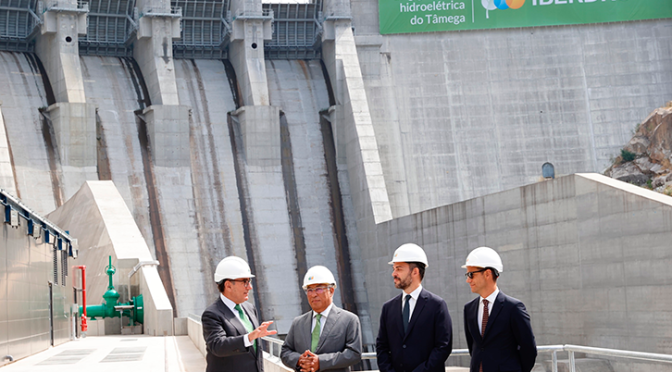Iberdrola reaffirms its commitment to Portugal, where it will increase investments in the coming years to 3 billion euros for wind energy and solar plants.
- The Gigabattery, with an investment of more than 1.5 billion euros, will be able to produce 1,158 MW and store the energy consumed by 11 million people a day in their homes. It will avoid importing more than 160,000 tonnes of oil per year.
- The project has an ambitious socio-cultural and environmental action plan of more than 50 million euros benefiting 7 municipalities.
- Iberdrola reaffirms its commitment to Portugal, where it will increase investments in the coming years to €3 billion for wind farms and solar plants already under development with 3,000 MW.
The Prime Minister of Portugal, António Costa, and the Chairman of Iberdrola, Ignacio Galán, inaugurated this morning in Portugal the Tâmega Gigabattery, a large hydroelectric storage project whose construction took almost eight years and involved an investment of more than €1.5 billion.
The event was also attended by the Portuguese Minister for the Environment and Climate Action, Duarte Cordeiro, the Secretary of State for the Environment and Energy, João Galamba, and the presidents of the Municipal Chambers of Ribeira de Pena, Vila Pouca de Aguilar, Boticas, Chaves, Montalegre and Cabeceiras de Basto.
Nearly two hundred people, including suppliers, employees, local and national authorities and journalists from Spain and Portugal witnessed this event, which represents an international milestone in the field of technology, civil works and environmental investment.
With a capacity of 1,158 MW, the Tâmega electrical power production system is capable of storing 40 million kWh, equivalent to the energy consumed by 11 million people during 24 hours in their homes, making it one of the largest energy storage systems in Europe.
The complex is made up of three power plants – Alto Tâmega, Daivões and Gouvães – and, thanks to its pumping capacity, can store energy to be used when it is most needed; a cycle of energy efficiency and true circular economy that will increase the total installed electrical power in Portugal and avoid the emission of 1.2 million tonnes of CO2 per year – without quantifying many millions more thanks to the renewable energy that can be integrated into the system – furthering the fight against climate change.
This major engineering project, on which several thousand people have worked, will prevent the importation of more than 160,000 tonnes of oil per year, consolidating its position as a socio-economic and job-creating driving force in the region.
In addition, the construction of the complex in this area of northern Portugal has been accompanied by an ambitious plan of social, cultural and environmental actions, benefiting seven municipalities, to which more than 50 million euros have been allocated.
As Ignacio Galán pointed out, the development of this large complex has been possible thanks to the environment of legal stability and good dialogue achieved by the Portuguese government in recent years. Furthermore, this infrastructure demonstrates that the two major goals of Europe’s energy policy, energy independence and decarbonisation, are perfectly compatible as long as work is done to electrify the economic and production system.
During his speech, Ignacio Galán also announced that the company will be able to double the investments made in the Gigabattery in the coming years, reaching €3 billion, which will be allocated to new wind farms and solar plants already under development or construction.
Iberdrola thus continues its strategy of sustainable growth that has positioned it as the largest electricity company in Europe, after investing €140 billion in the last 20 years and supporting more than 19,000 companies with its purchases, through which it generates 400,000 jobs. In tax contributions alone, Iberdrola allocates €8 billion each year in the more than 30 countries where we are present.


